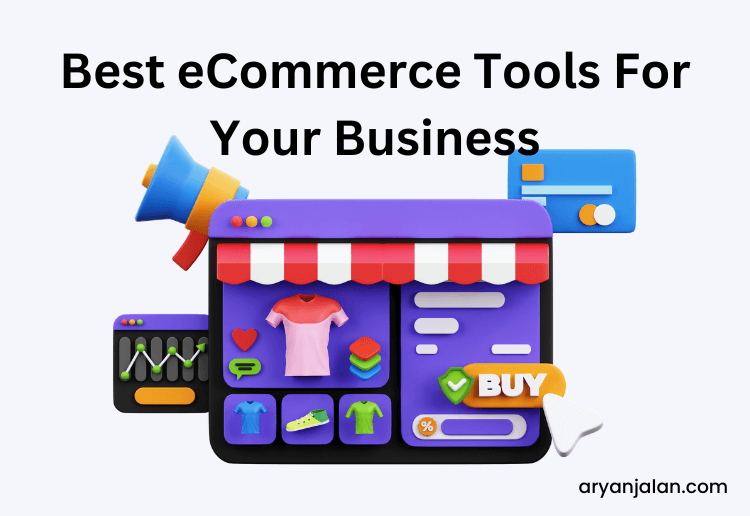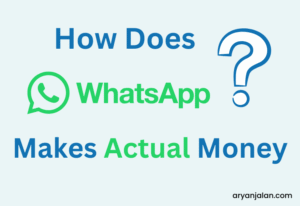With the growing software trends, now you can very easily manage your business day-to-day operations with the best ecommerce tools. These popular eCommerce business tools can easily streamline your daily tasks and improve your marketing and customer service efforts.
As you may know, the global e-commerce market is expected to reach $8.14 trillion by 2026. By using these best e-commerce tools, you can create a bigger impact with your business and generate more revenue.
To simplify your researching task, we have curated a list of the best ecommerce tools for your business to help you make more informed decisions in 2026.
E-commerce Builder Tools
Choosing the right eCommerce builder platform is your first step to start your eCommerce business. Nowadays, you don’t need any coding skills or a software developer team to do this.
Popular tools like Shopify, Wix, WooCommerce, etc, offer drag-and-drop features, pre-designed templates, and themes for all kinds of eCommerce businesses. With their user-friendly and DIY interfaces, you can set up your eCommerce store in just 1-2 days.
1. Shopify
Shopify is an all-in-one hosted eCommerce platform popular with small and medium-sized businesses. The tool is known for its user-friendly interface, customizable templates, fast loading speed, and in-app store.

Features:
- The platform has built-in marketing tools.
- It offers free and paid themes with mobile responsive design.
- It records and tracks inventory for up to 250 locations.
- It offers 80+ powerful tools to boost your e-commerce business.
- The platform also supports drop shipping.
- It easily integrates with over 100 payment providers.
Pricing:
- Free trial available. Its paid plan starts at $29 per month.
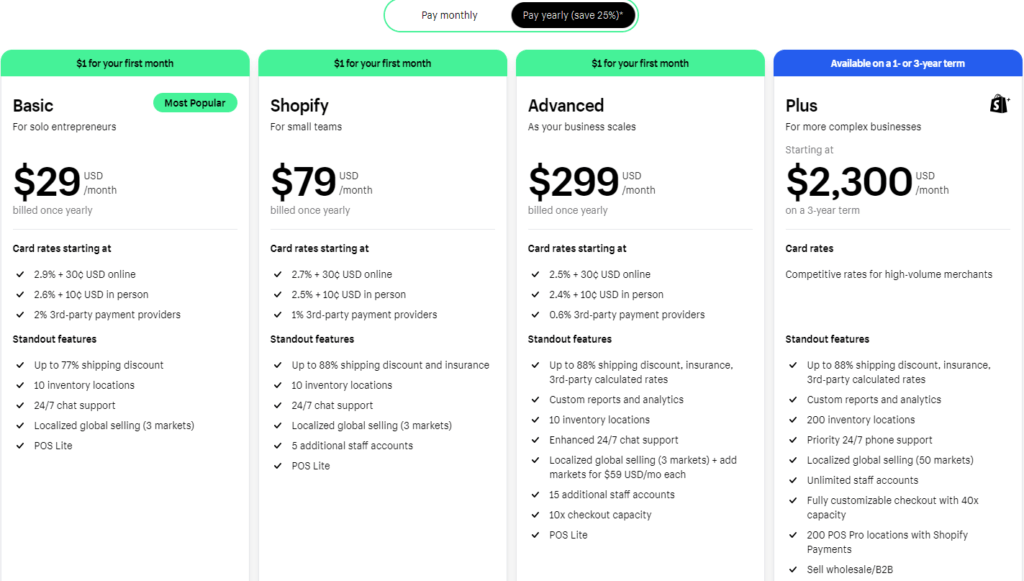
2. WooCommerce
WooCommerce is a popular, free WordPress-based eCommerce platform ideal for small and medium-sized businesses. At present, over 4.7 million stores run on the WooCommerce platform. The tool offers extensive flexibility and hundreds of extensions to enhance its functionality. This high level of customization allows business owners to sell a wide variety of products.
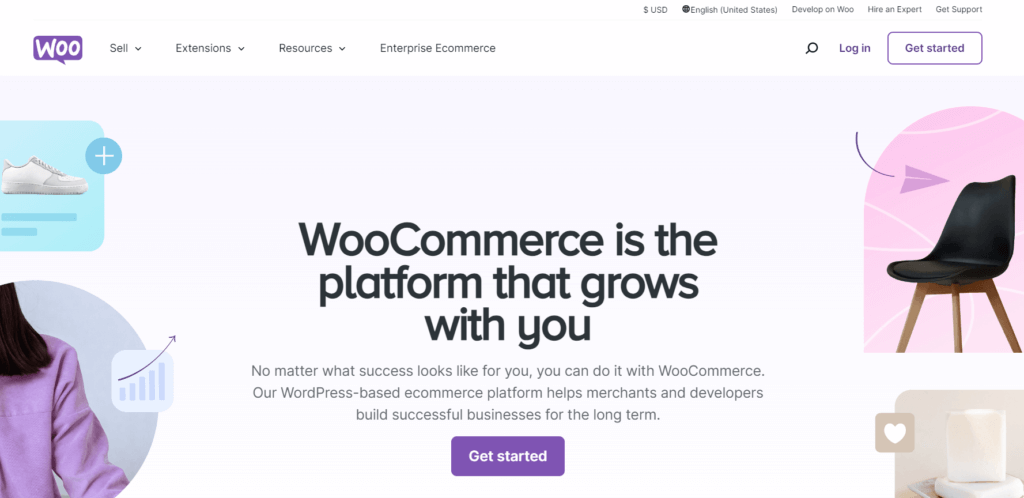
Features:
- It only supports WordPress.
- The platform has built-in analytics and marketing tools
- It supports 140 secure region-specific gateways.
- It offers free and paid plugin support for customization
- It also offers multilingual support.
- Integrating various accounting, POS, and warehouse management system
Pricing:
- Woocommerce is free. You just have to pay for your hosting services and for exclusive addons with Woocommerce.
3. BigCommerce
BigCommerce is an enterprise-level e-commerce platform. As a leading SaaS e-commerce platform, it integrates with payment providers, email marketing tools, customer service tools, and analytics. The platform offers hosting, top-notch security, and a suite of marketing tools.
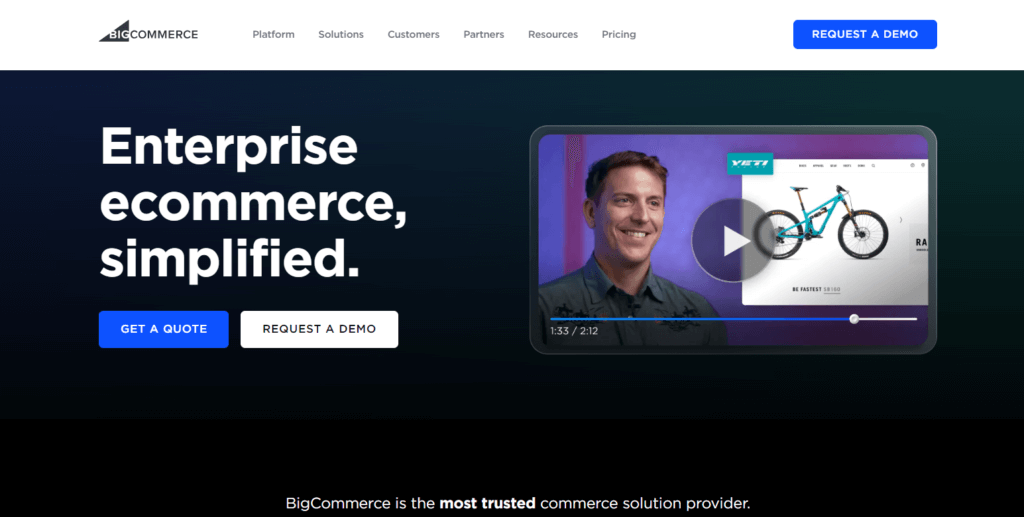
Features:
- The platform has no additional transaction fee.
- Helps you create multiple unique storefronts
- Fully customizable theme with built-in HTML, JavaScript, and CSS.
- Integrate with top marketplaces like eBay, Amazon, and Google Shopping.
Pricing:
- There is a 15-day free trial available. The paid plan starts at $29 per month.
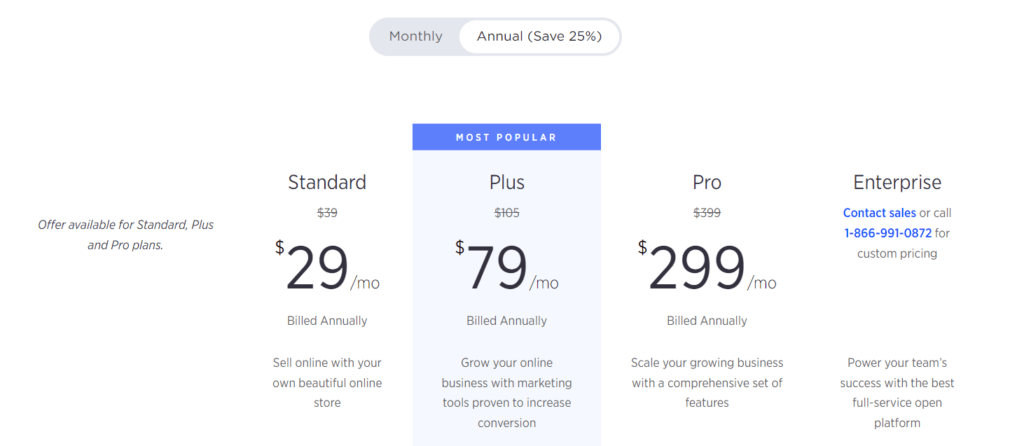
E-mail Marketing Tools
Email marketing can be the game changer for your eCommerce business. These email marketing tools increase your sales and overall customer engagement. With their advanced features, you can automate your engagement workflow of your existing customer.
Tools like Mailchimp, Klaviyo and Omnisend are some of the best tools in the list and offer various customizable templates. These templates will help you to build a relationship with your customers.
1. Mailchimp
Mailchimp is a popular email marketing and automation platform. It lets you effortlessly create, send, and track email campaigns. You can set up personalized workflows based on consumer behavior and segment your audience by demographics or location for more targeted email marketing.
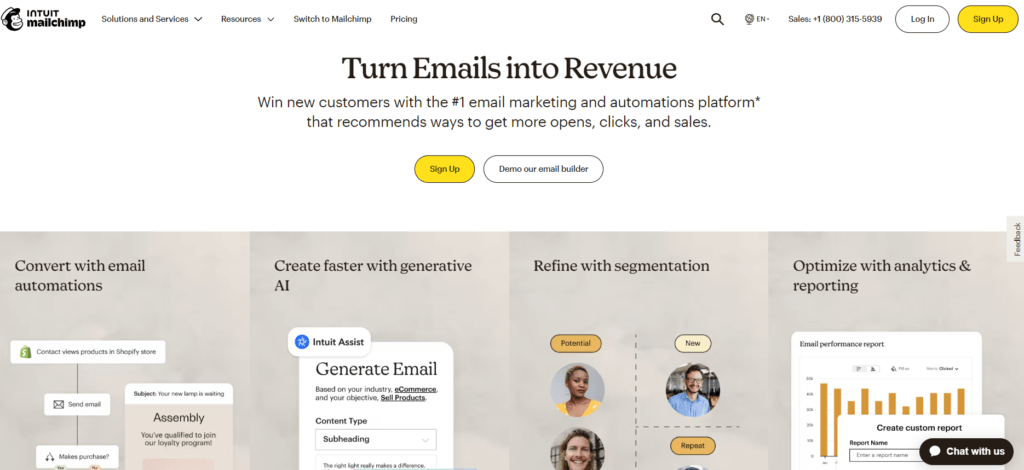
Features:
- The platform has an easy-to-use interface.
- It offers tools like marketing automation, landing page creation, and social media management.
- Automate welcome messages, order confirmations, and abandoned cart reminders.
- It offers 300 app integrations and customizable pre-designed templates.
Pricing:
- Mailchimp offers a free plan that includes up to 500 contacts. It’s paid plan starts at $9 per month.

2. Klaviyo
Klaviyo is a robust email marketing tool designed especially for eCommerce businesses. It offers advanced segmentation and integrates with 350+ tools, such as Shopify and WooCommerce.
Klaviyo manages your customer email list efficiently. It lets you send personalized emails, SMS flows, and campaigns. Additionally, it supports mobile-optimized emails, online forms, and landing pages, ensuring your content looks great everywhere.
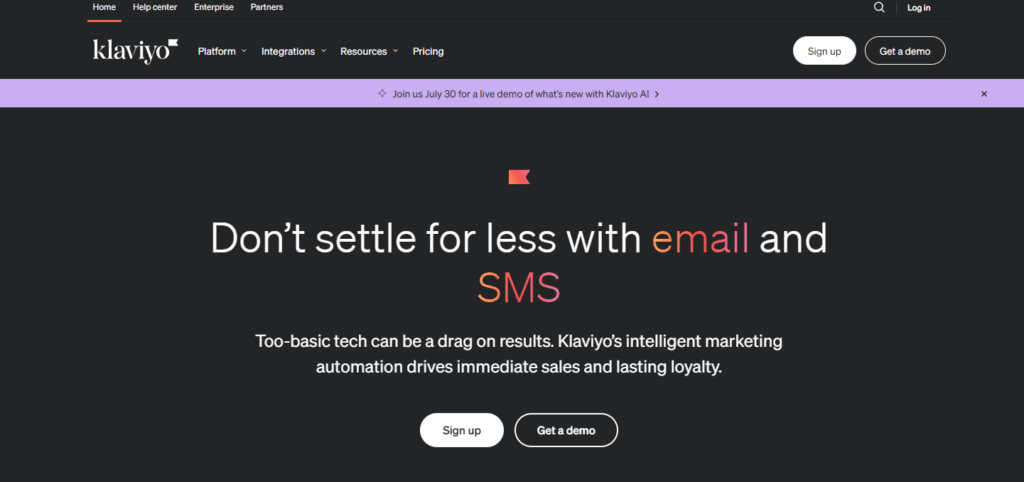
Features:
- It offers ROI-based reporting.
- Test different versions of emails, landing pages, and forms with A/B testing.
- Easy to edit and use drag-and-drop responsive email templates.
- Create segments and triggers with comprehensive historical and real-time data.
Pricing:
- Klaviyo offers a free plan with 500 free monthly email sends. Its Email plans start at $45/month.
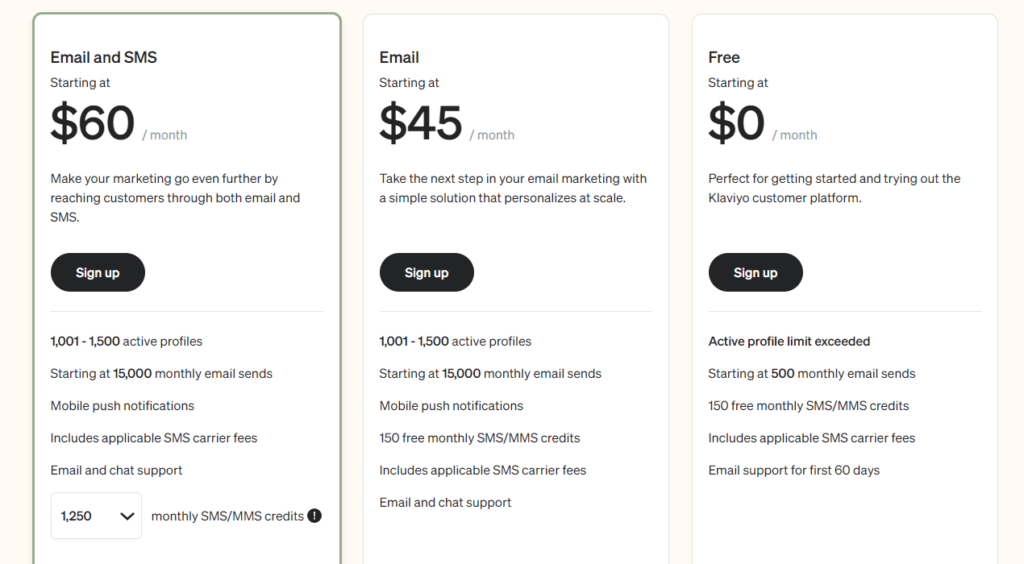
3. Omnisend
Omnisend is an all-in-one e-commerce marketing platform designed for small and medium-sized businesses. It helps businesses reach their audience through various channels. The tool specializes in multichannel marketing and combines emails, SMS, and web push notifications. It offers over 130 integrations with platforms like WooCommerce, Wix, and Shopify.
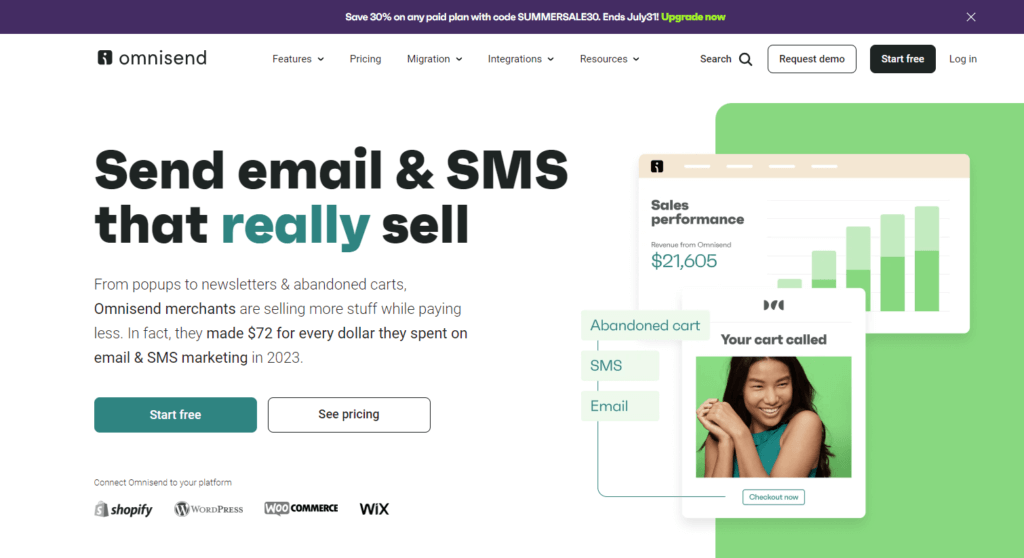
Features:
- It has an easy-to-use interface
- It offers library of templates and has a drag and drop email builder
- Generates automation reports to simplify marketing efforts.
- Offers automated workflows to create personalized messages
Pricing:
- Omnisend offers a free plan for up to 250 contacts. The paid plan starts at $16 per month.

Social Media Marketing Tools
Social media marketing tools are another essential list of tools for your eCommerce business. These tools are useful for managing, analyzing, and enhancing your presence on platforms like Facebook, Instagram, Twitter, Snapchat, Pinterest and LinkedIn.
In addition to these, you can also take advantage of AI voice generators to create engaging audio content that complements your social media strategy.
Tools like Hootsuite, Buffer, sprout social, etc., make creating and sharing content much easier. These tools help you to schedule posts, automate responses, and analyze their performance all at one tool.
1. Hootsuite
Hootsuite is a popular social media management tool that makes it easy to handle all your social media accounts in one place. With Hootsuite, you can schedule posts, create content plans, and perform social listening. You can also track your social media performance across multiple platforms like Facebook, Twitter, and Instagram.
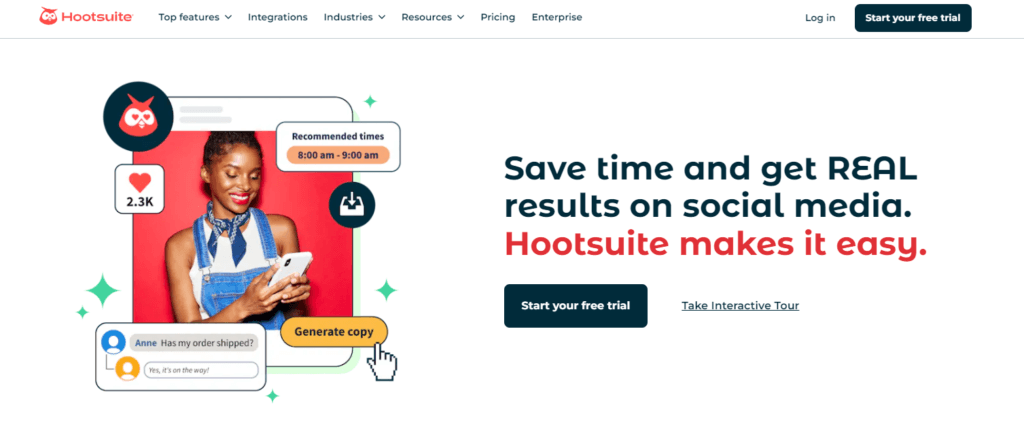
Features:
- It offers built-in Canva templates and free stock images.
- With the help of OnlyWriter AI, generate captions, hashtags and post ideas.
- Schedule up to 350 posts (almost for a year) with their social media scheduler.
- Tracks key metrics, such as likes and reach impressions across various platforms.
- With Hootsuite streams, monitor hashtags and key phrases relevant to your industry.
Pricing:
- Hootsuite has a 30-day free trial plan. It’s paid plan starts at $99 per month.
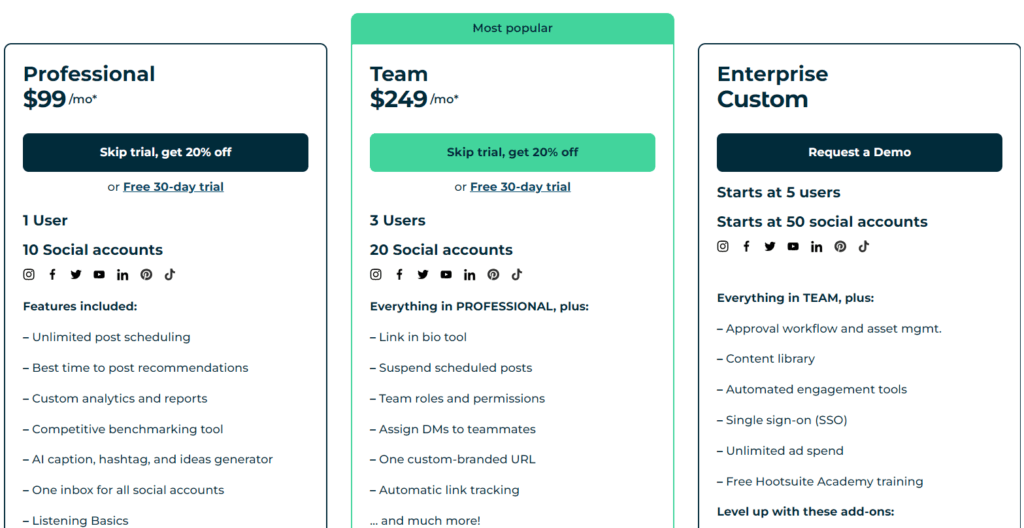
2. Buffer
Buffer is another popular social media management tool specially designed for small businesses. It lets you schedule, publish, and analyze social media content across 35 social media networking sites. The tool also provides insights about your posts’ engagement and reach, helping you understand what works best for your audience.
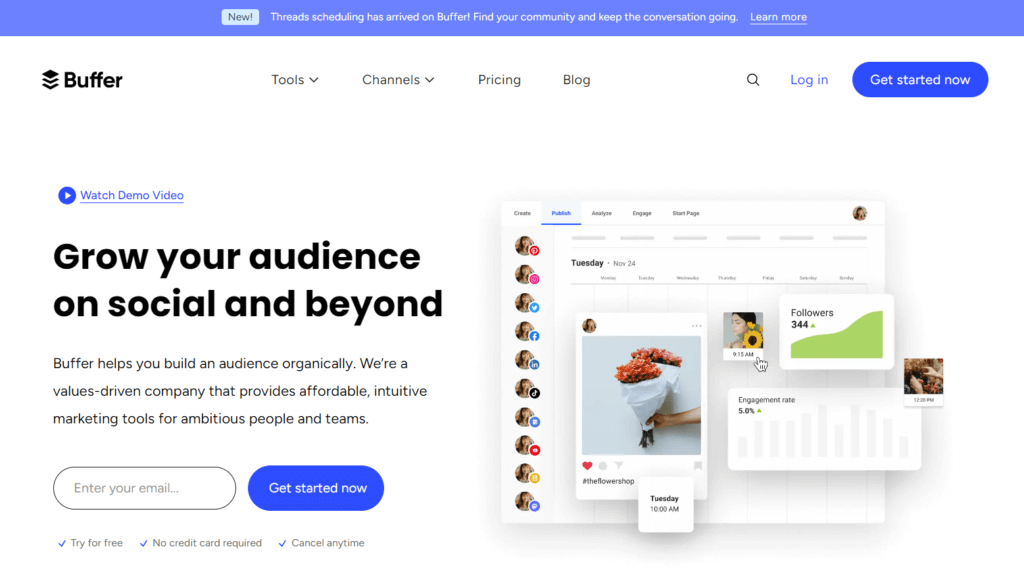
Features:
- It has a user-friendly interface.
- Schedules posts on various social media sites all at once.
- Automates report generation and provides insights into performance.
- Generate captions and hashtags, brainstorm ideas, and automate replies with its AI assistant.
- Helps you compare the results of paid vs. organic posts.
- Integrates with over 50+ tools that help you with publishing, organizing and creating your content.
Pricing:
- With Buffer’s free plan, you can connect up to 3 channels. Paid plans start at $5 and $10 monthly, and they offer a 14-day free trial.
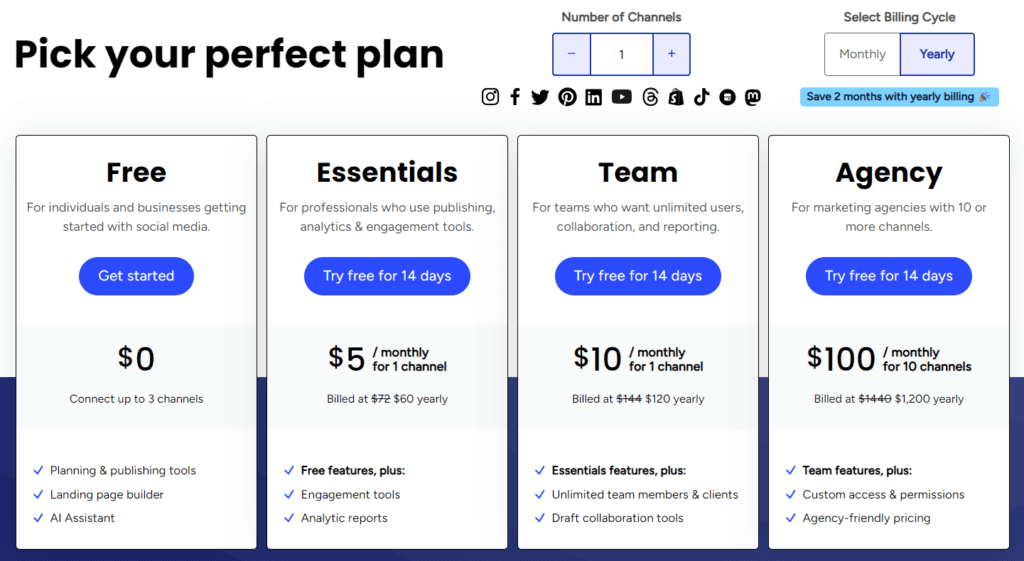
3. Canva
Canva is a free online tool for creating visuals for social media, presentations, posters, or logos. It offers pre-designed templates and a vast library of images, videos, and fonts. The tool is optimized for various devices. It is perfect for small businesses and individuals looking to create professional-looking graphics.
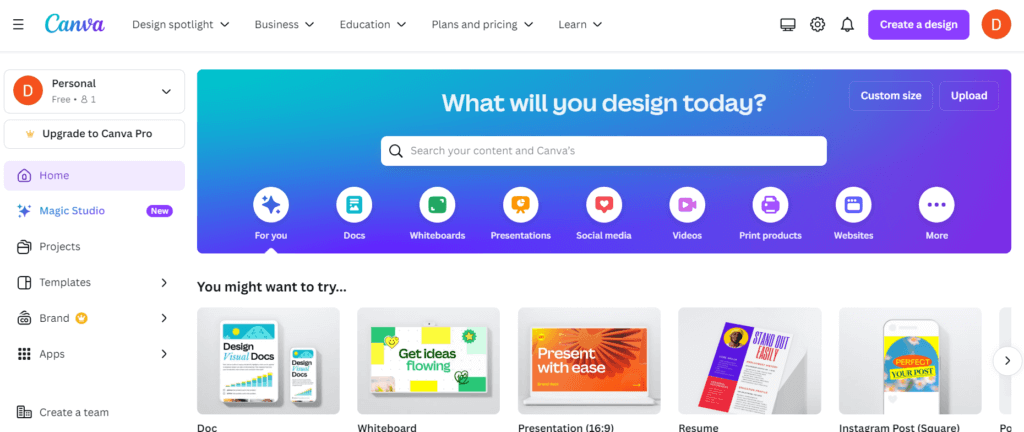
Features:
- It has a user-friendly drag-and-drop interface
- It offers a wide range of templates and tools to create graphics.
- It offers a free AI image generator, a free online video converter and a PDF converter.
- It also has a feature to convert text to speech and can easily integrate with 75+ apps.
Pricing:
- It has a lifetime free plan. The paid plan or pro version offers you more advanced tools and AI features.
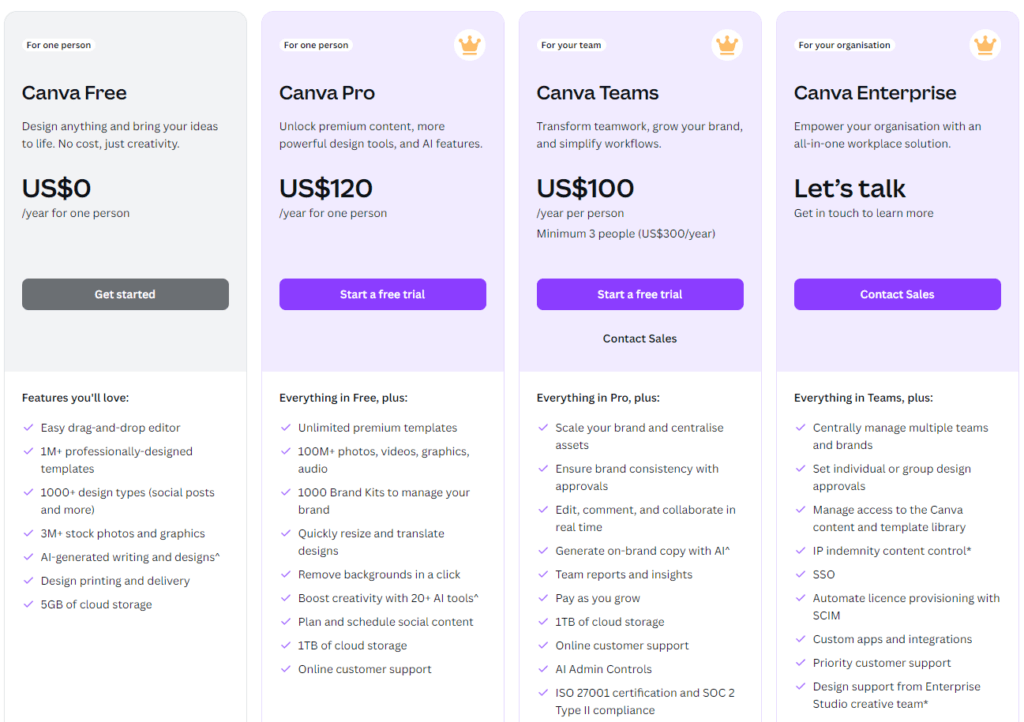
Analytics Tools
Understanding your website performance is important when running an e-commerce website. Tools like Google Analytics, Hotjar, Woopra, and more help you analyze website traffic, online sales, consumer behaviour, and your competitor’s strategies.
They give you insights into what’s working and what’s not by tracking metrics such as traffic, conversion rates, sales performance, and ROI. They can help you identify trends, optimize your marketing efforts, and ultimately grow your business more effectively.
1. Google Analytics
Google Analytics is a free web analytics tool for e-commerce businesses. It helps you track your website’s traffic and performance. It shows you how customers interact with your site through real-time data and detailed reports. This information helps you optimize your online presence and improve your website’s performance.
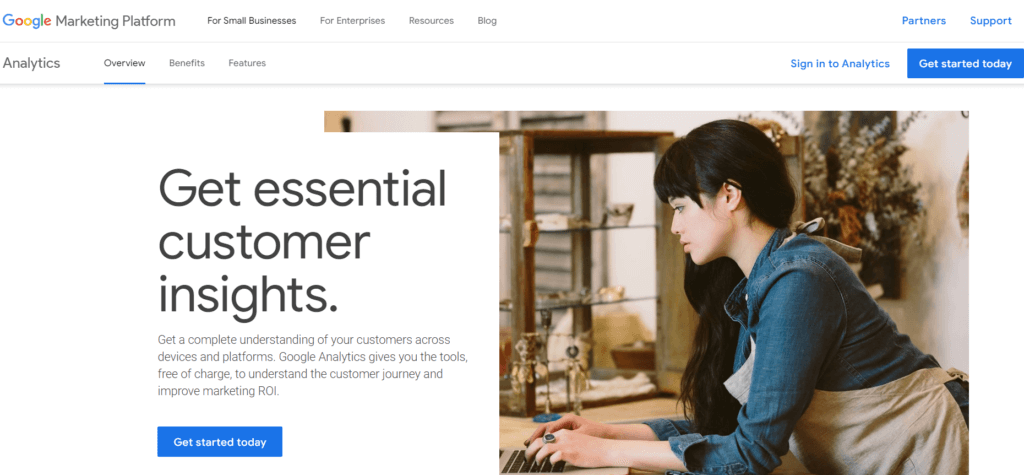
Features:
- It offers real-time reporting.
- Provides customer demographics and browsing behaviour.
- It also offers metrics like organic conversions, engagement rate, bounce rate, and more.
- The tool also helps you track sales and revenue generated from your online store.
Pricing:
- Google Analytics is free of charge for all.
2. Hotjar
Hotjar is an e-commerce analytics tool that combines analytics with user feedback. It offers insights through heatmaps, which show where users click, scroll, and spend the most time. You can track visitors’ data, see where they come from, and see which pages they visit. These insights help you make informed decisions to enhance your online presence and improve the user experience.
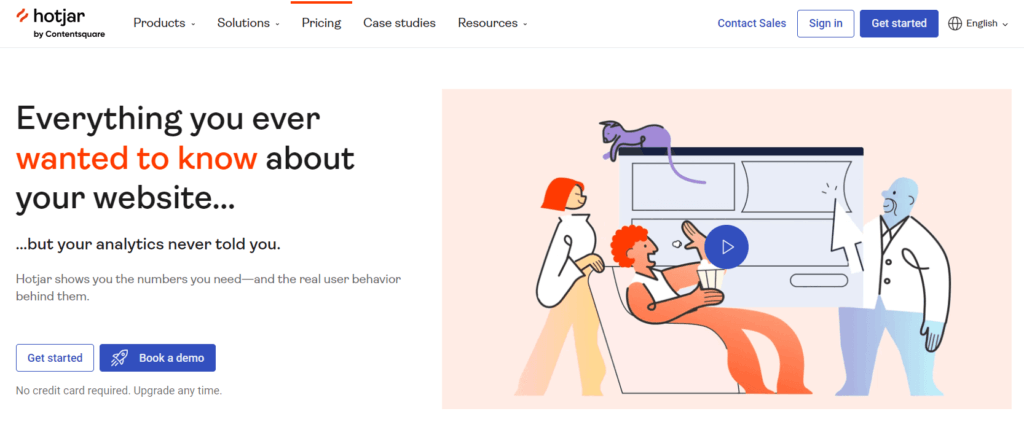
Features:
- It provides session recordings to show how users navigate through your site.
- It also offers feedback tools like surveys and polls.
- Conversion funnels show you where users drop out of your sales process.
- It integrates with platforms like Shopify, Google Analytics, Slack, and more.
Pricing:
- It has an all-time free plan available. It paid plans start from $32 per month.
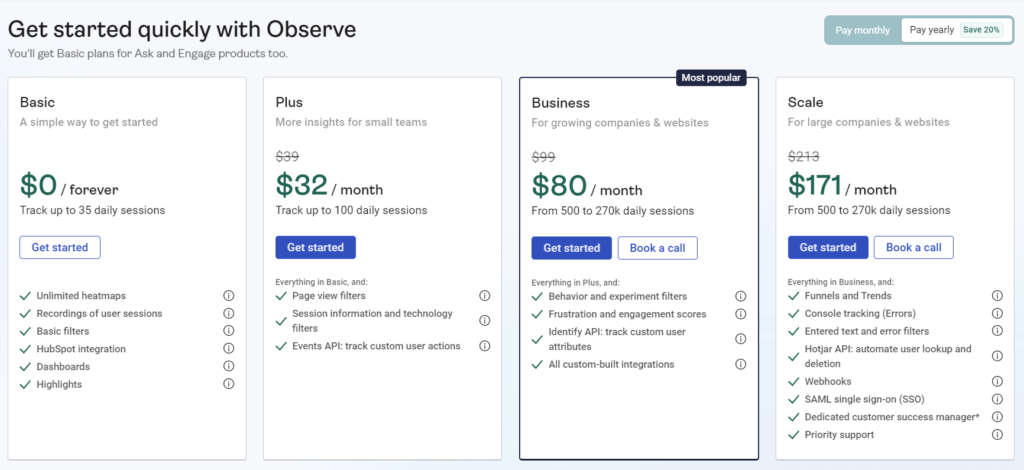
3. Woopra
Woopra is another advanced customer journey and product analytics tool. It tracks and analyzes customer journeys across your website, products, and mobile apps. It helps you understand trends, analyze retention and segmentation, and provide valuable reports. This insight lets you make better decisions, enhance customers’ experiences, and boost business performance.

Features:
- The platform has an easy-to-use interface.
- Helps you build detailed reports on customer journeys, trends, profiles, retention and churn.
- Provides real-time individual-level analysis.
- It can initiate real-time triggers and automation based on user behaviour. The tool offers 50+ one-click integrations
Pricing:
- Woopra offers a free plan with 30+ integrations and a pro plan starting at $999 per month.
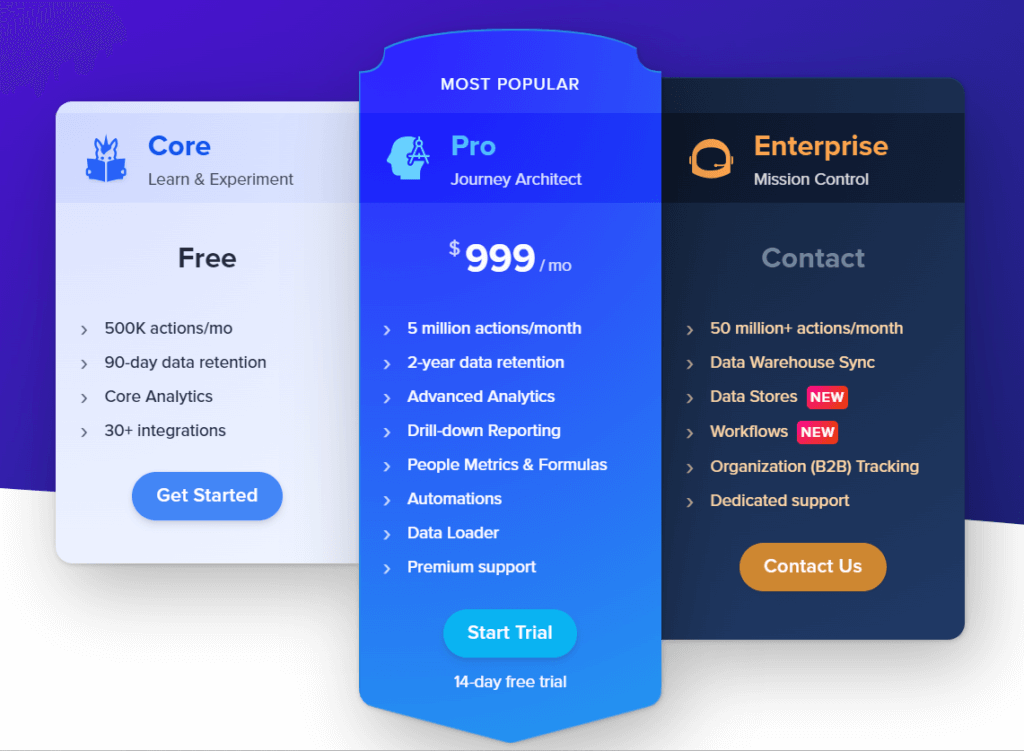
SEO Tools
With e-commerce set to make up 22.6% of global retail sales by 2027, using SEO monitoring tools is crucial for staying competitive. E-commerce SEO tools like Ahrefs, SEMRush, and MozPro help businesses improve search engine rankings and drive more traffic.
They provide insights into customer searches and assist with keyword research. The tools also help with competitor analysis, on-page SEO audits, backlink tracking, and performance analytics, ensuring your content is tailored for higher rankings.
1. Google Search Console
Google Search Console (GSC) is a free SEO tool from Google, that helps you monitor and improve your search performance. It provides insights into your website’s search traffic, impressions, and click-through rates (CTR). With GSC, you can analyze your top-performing pages and track keyword rankings.
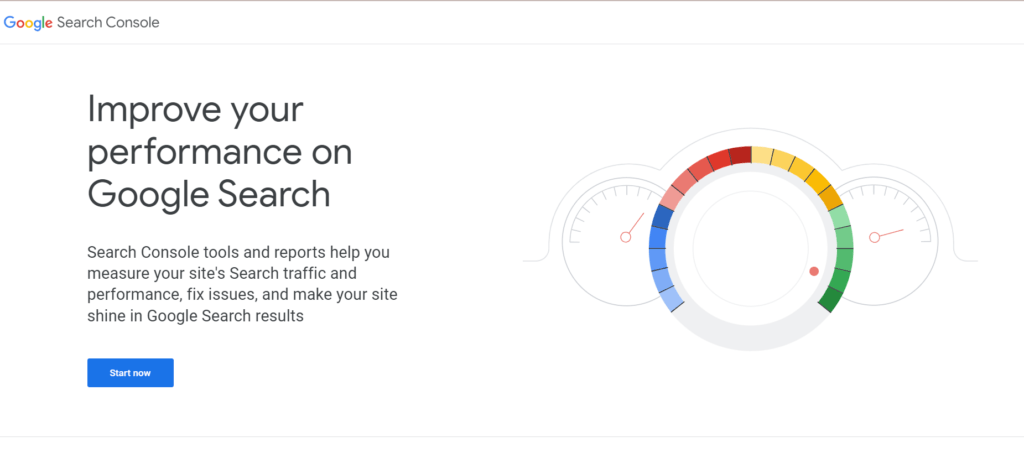
Features:
- Provides detailed insight into indexing issues.
- It allows you to submit sitemaps and individual URLs for crawling.
- Helps improve Core Web Vital’s score with mobile and desktop reports.
- Sends alerts about crawl errors, indexing issues, and mobile friendliness problems.
- Provide access to real-time data and compare performance across various devices.
Pricing:
- Google Search Console is free for all for a lifetime
2. Ahrefs
Ahref is one of the best SEO tools in the market. It excels at keyword research, tracking website performance, and conducting site audits. It also provides insights into backlink analysis and competitor research. The tool helps identify and fix technical issues such as broken links, duplicate content, and slow page loading times.

Features:
- Ahref is easy to navigate and use
- It offers comprehensive and insightful reports
- It offers a free version of the Ahref Web Master tool
- Its rank tracker tool lets you monitor your rankings for specific keywords.
- Discover content ideas and link opportunities with Ahref’s content explorer tool.
Pricing:
- Ahrefs pricing starts from $129 per month.
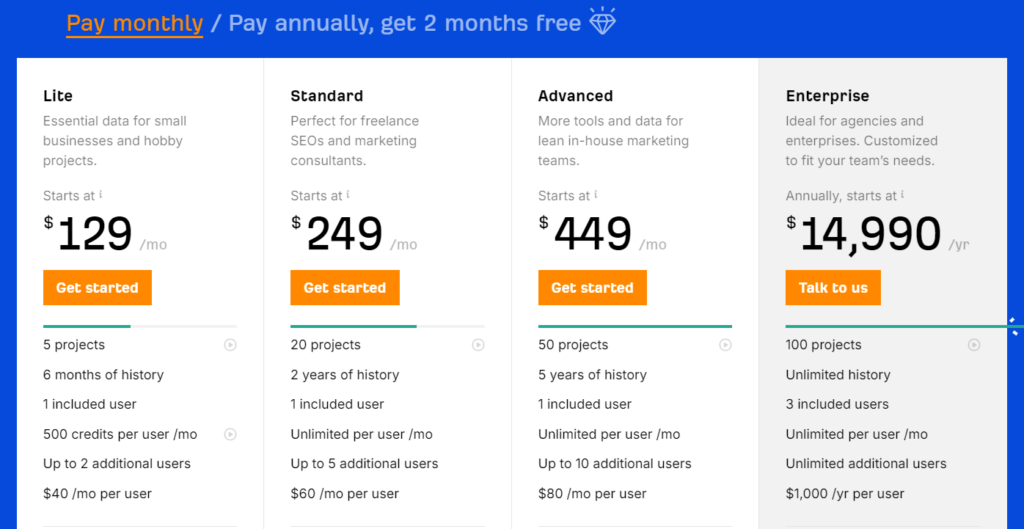
3. SEMRush
SEMRush is another popular and comprehensive SEO and marketing tool that enhances online visibility and search rankings. It is perfect for small business owners. With SEMRush, users can conduct detailed website audits, perform keyword research and analyze competitors. It also offers content marketing insights and technical SEO solutions.
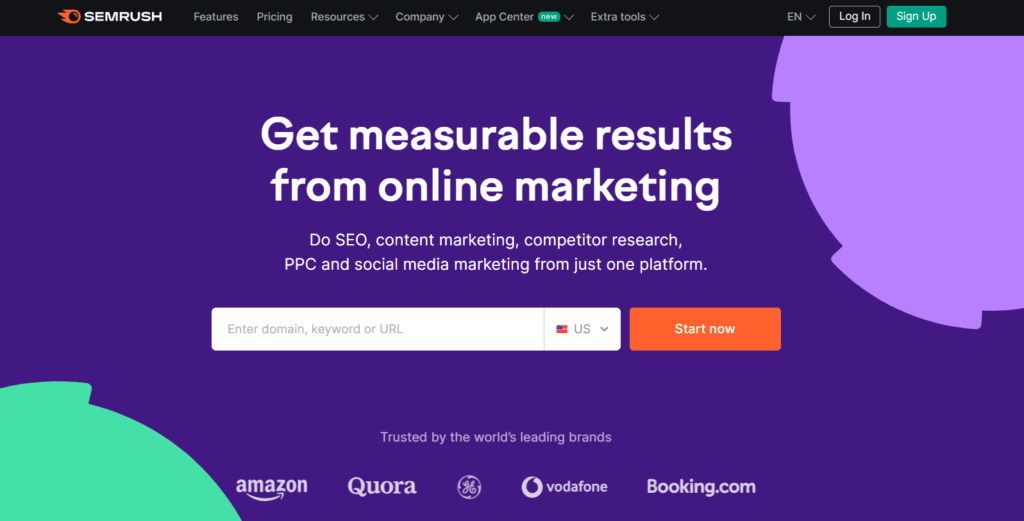
Features:
- It identifies technical SEO issues and offers recommendations for improvement.
- Manages paid advertising campaigns across PPC and social media platforms.
- Its Keyword Magic Tool helps explore millions of keyword suggestions.
- Helps you discover unique opportunities to strengthen your backlink profile and enhance website authority.
- Easily integrates with Google Analytics, Google Search Console, CrazyEgg, and Hotjar.
Pricing:
- It offers a free plan with limited features. Semrush paid plan starts at $139 per month
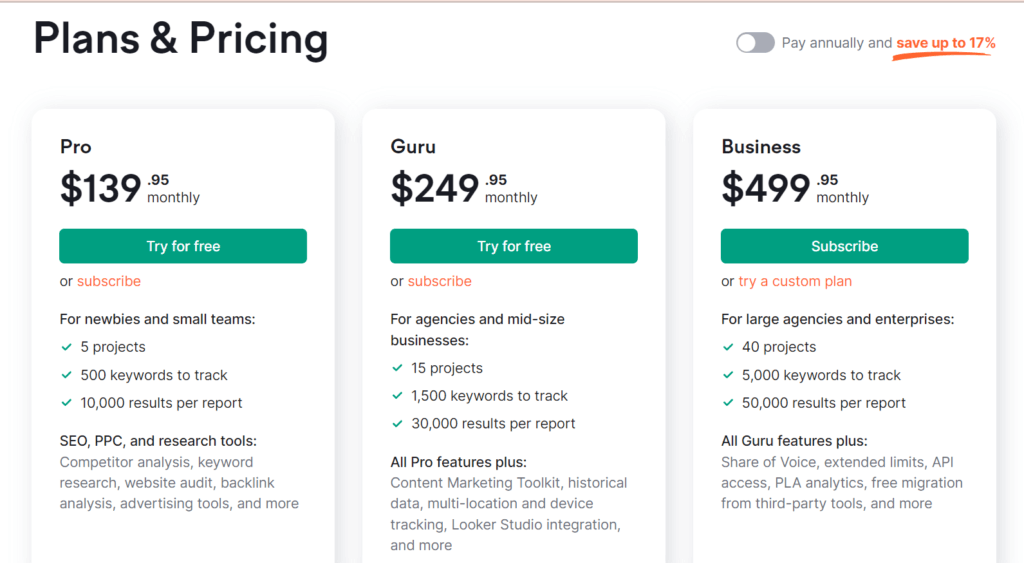
Customer Service Tools
With 89% of customers likely to return after a great service experience, e-commerce businesses must enhance customer service options to keep customers happy. Customer service tools like Zendesk, Zoho Desk, and Helpscout help businesses connect with customers more effectively.
These tools streamline communication, solve problems quickly, and offer 24/7 support. They also boost efficiency, offer valuable insights, and help build a strong reputation.
1. Help Scout
Help Scout is a popular customer service platform. It offers a shared inbox for managing customer emails, a help center, and live chat software for real-time assistance. It gives customers 24/7 access to instant answers. This helps decrease average response time by 30 minutes and increase customer satisfaction. It also automates repetitive tasks and prioritizes support requests, ensuring consistent and timely responses.
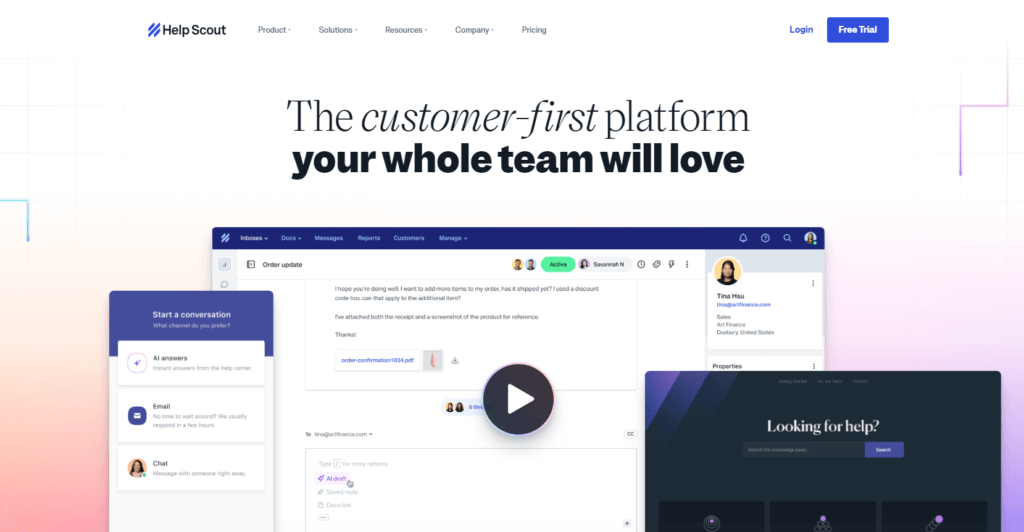
Features:
- Engage with customers in real-time with live chat.
- Provides analytics tools that offer business metrics and track progress
- Offers omnichannel support and proactive messaging.
- Reduces email volume by 30% by helping customers find answers to common questions.
- Automates faster replies 24/7 and resolves 36% more emails with AI.
Pricing:
- It offers a 30-day free plan. It’s paid plan start from $22 per user per month.
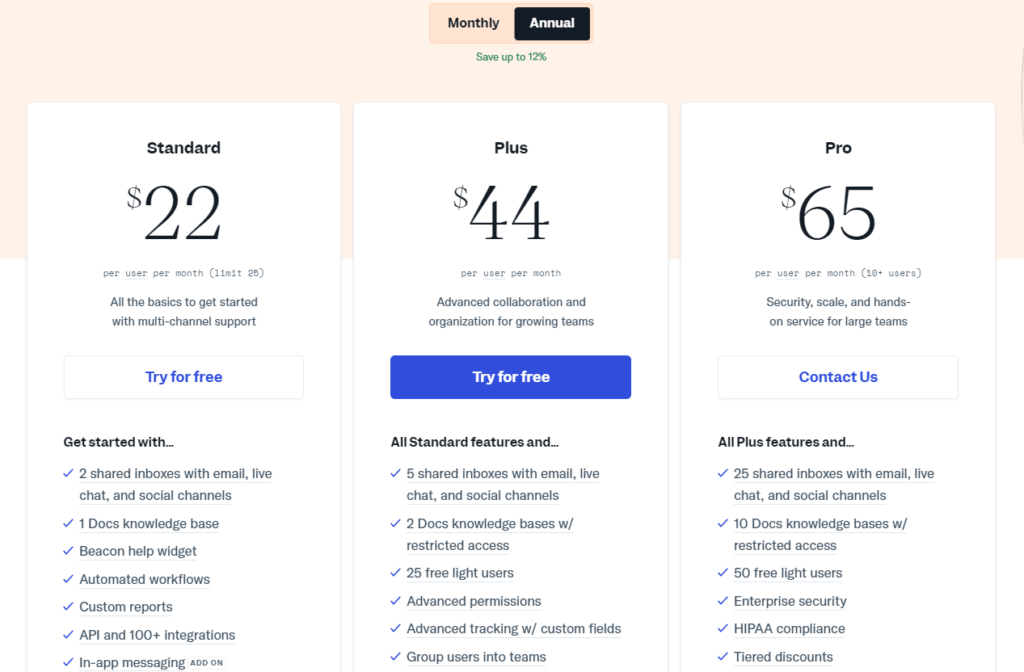
2. Zendesk
Zendesk is a customer service software popular for its ticketing system. It helps businesses manage and respond to customer inquiries. The tool supports various communication channels like email, chat, and social media. With the help of its AI-powered tools, agents can easily create, prioritize, and track tickets to resolve issues quickly.
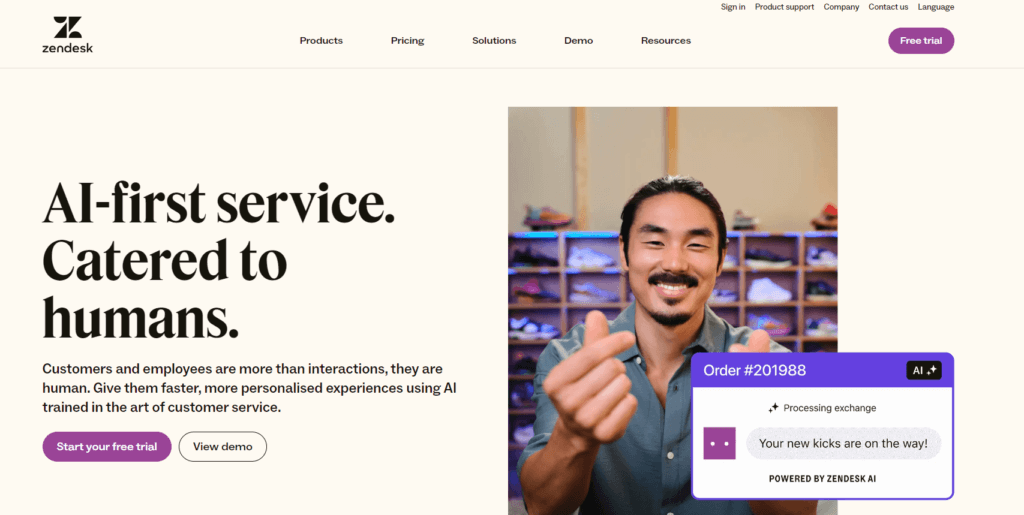
Features:
- Offers omnichannel support and supports third-party apps. It also offers pre-built reports about customer support performance.
- Automatically creates and routes tickets based on customer messages.
- Uses AI to monitor all customer interactions for quality assurance.
- Includes a knowledge base and forums for finding answers to common questions.
Pricing:
- Zendesk offers a 14-day free trial. It’s paid plan starts at $55 per month billed annually.
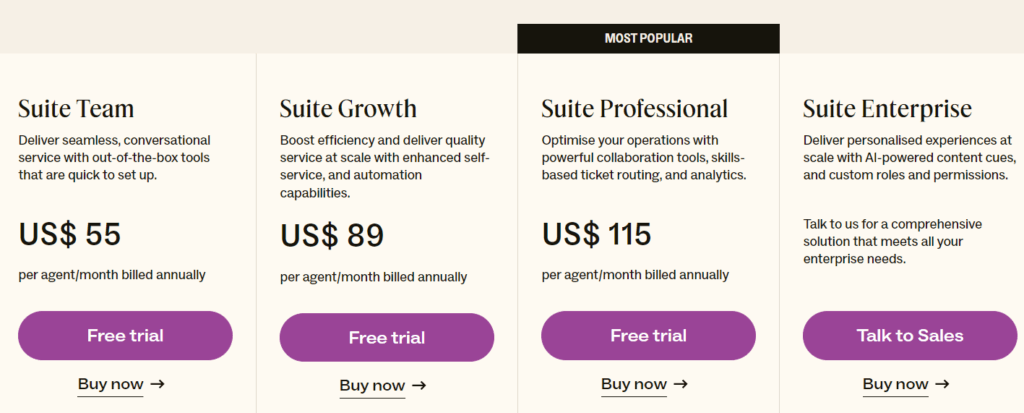
3. Zohodesk
Zoho Desk is another popular customer service platform. It helps businesses manage customer requests from email, phone, and social media all in one place. It features a ticketing system to handle inquiries efficiently and ensure quick resolutions. Zoho Desk also includes live chat and web forms for collecting customer information. The tool has a self-service portal to help customers find answers.
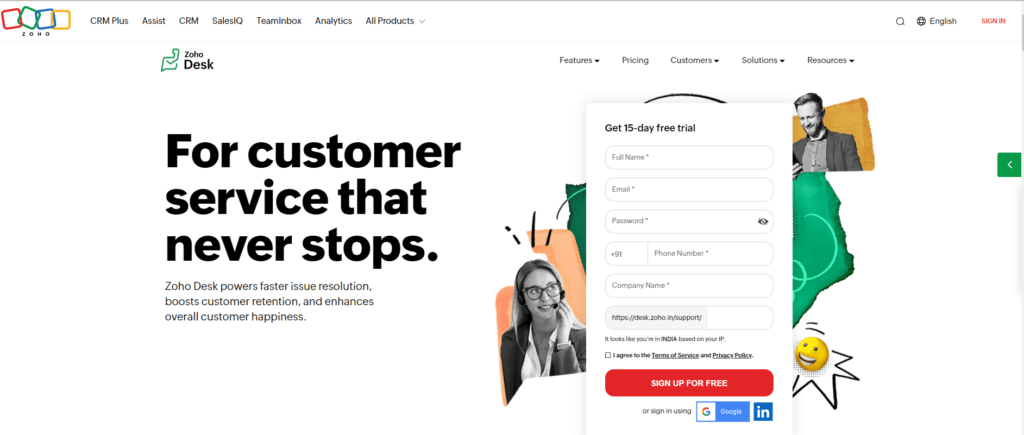
Features:
- Highly customizable platform with an easy-to-use interface.
- AI and automation tools speed up responses and personalize interactions.
- Offers telephony support with a cloud call center and other call features.Offers reporting and analytics tools to monitor and improve customer service.
- It also offers a number of add-ons and integrations.
Pricing:
- The plan starts at $14 per month per user.
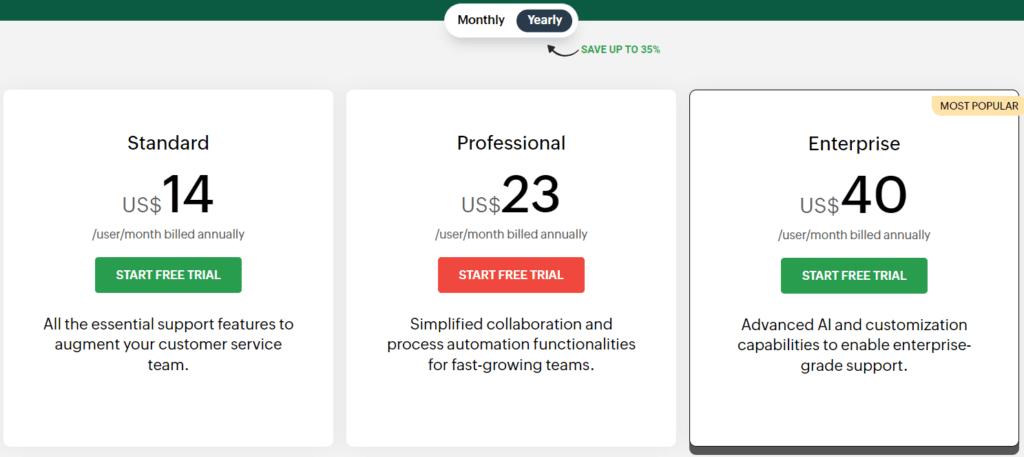
Inventory Management Tools
If you want to run a successful e-commerce store, you must always maintain optimal inventory levels to keep customers satisfied and sales flowing. That’s where e-commerce inventory management tools come in. These tools help you track stock levels, sales, and movements while automating order fulfilment.
Tools like Zoho inventory, inflow inventory, and more automate inventory tasks, save time, and reduce errors. This helps businesses meet customer demands efficiently and improve overall business operations.
1. Zoho Inventory
Zoho Inventory is a cloud-based inventory management software. It is especially designed for small and medium-sized businesses. The tool helps you create and manage sales and purchase orders, track inventory, and manage multi-channel orders. You can also automate tasks like order fulfilment, invoicing, and shipping.
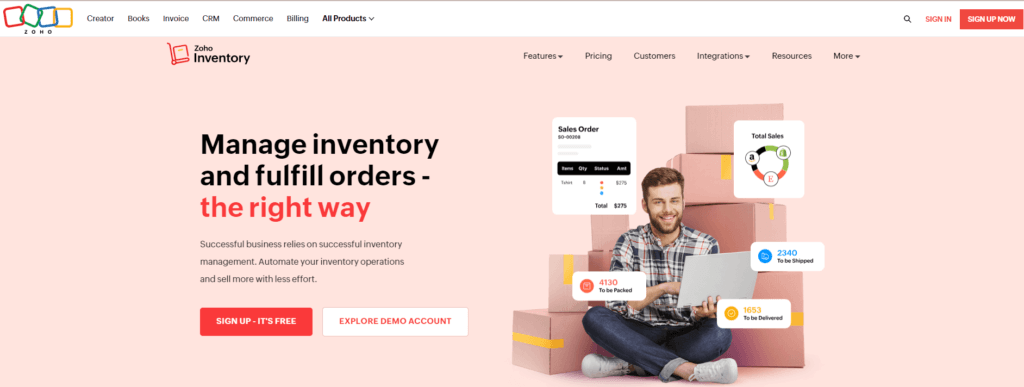
Features:
- It controls warehouse operations.
- It offers real-time tracking and sets alerts when the stock is low.
- Provides detailed business reports on sales, purchases, expenses, and more.
- Offers a SKU generator to keep your item’s naming consistent and clear.
- Integrates with shipping carriers and payment getaways.
Pricing:
- Zoho Inventory paid plan starts at $29 per month.
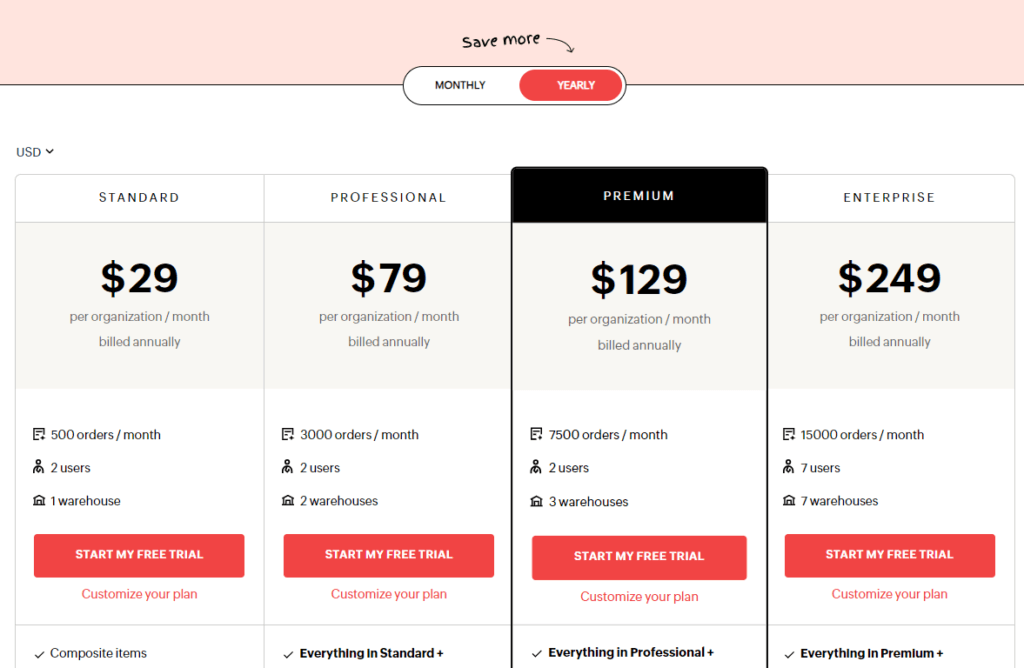
2. Cin7Core
Cin7 Core is a full-integrated cloud-based inventory management software. It helps you manage inventory, sales, and purchase orders in one place. Cin7 Core includes tools for inventory management, point of sale, and supply chain management. The tool also helps you track inventory across multiple locations, automate order processing, and manage your warehouse efficiently.
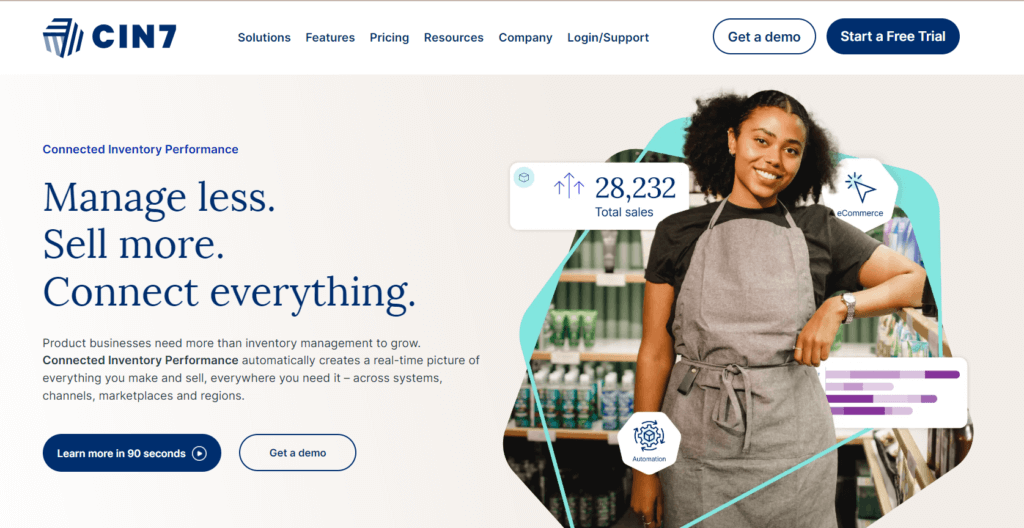
Features:
- Syncs inventory around multiple stores and warehouses.
- Notifies with automatic alerts when the stock decreases.
- Offers an integrated e-commerce portal to optimize sales and display products, inventory, and pricing for B2B clients
- Integrates with various sales channels, payment gateways, and shipping carriers.
Pricing:
- Cin7 core offers a free plan. It paid plan starts at $349 per month.
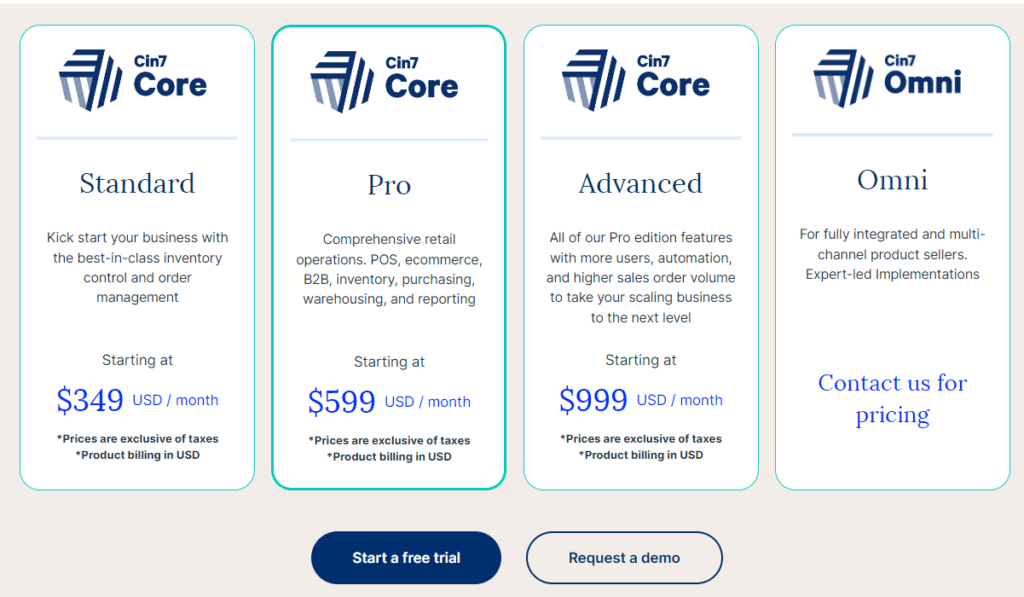
3. inFlow Inventory
inFlow Inventory is one of the easiest and user-friendly inventory management software. It is especially designed for small and medium-sized businesses. The software easily manages inventory, tracks orders, and handles sales and purchases. It allows for easy purchase order creation and vendor management. The tool also provides insightful reports on inventory valuation, stock levels, and sales trends.
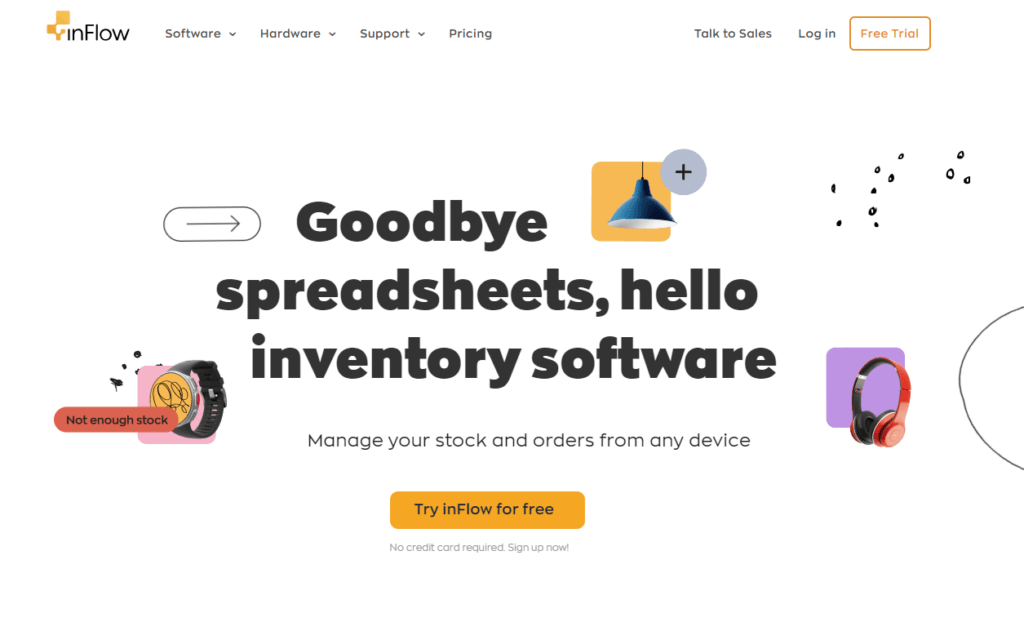
Features:
- Offers barcode scanning and generation.
- It also offers real-time tracking and help prevent stock-outs and overstocking.
- Integrates seamlessly with ecommerce platforms like Shopify and Amazon.
- Speeds up shipping by comparing carrier rates from USPS, DHL and more.
Pricing:
- The platform offers a 14-day free trial. It’s paid plan starts from $89 per month.
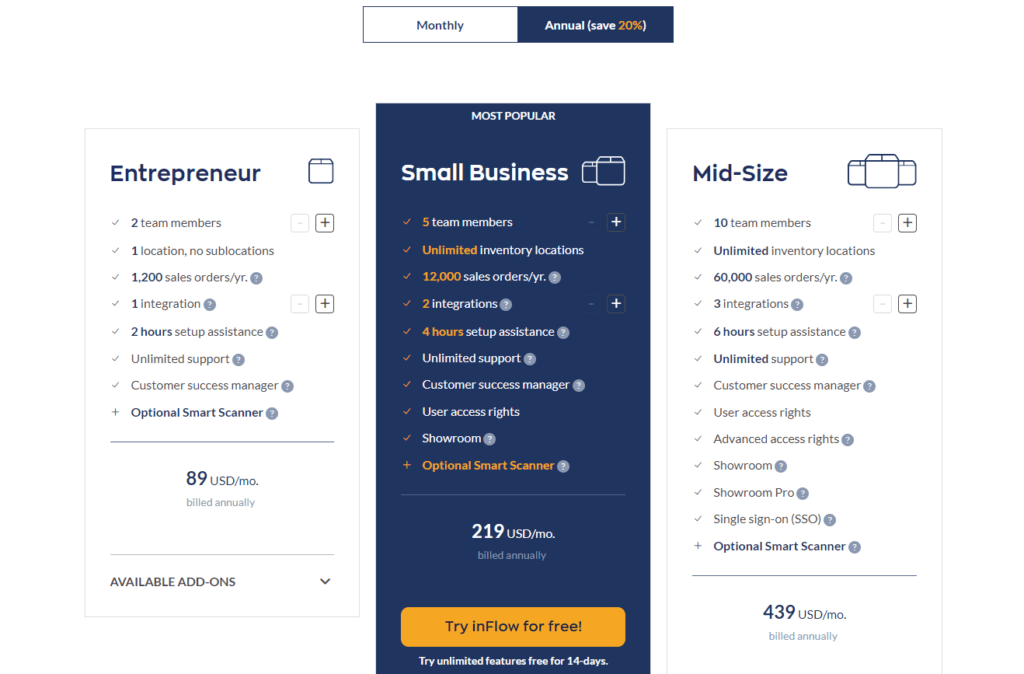
Shipping Software Tools
Managing shipping for an online store can be overwhelming. That’s where shipping platforms like Aftership, Shippo, and others come in handy. They help businesses manage orders, track shipments, generate shipping labels, and optimize delivery routes.
Tools like AfterShip, ShipStation reduce shipping errors and save time. They enhance customer satisfaction with reliable, efficient delivery.
1. AfterShip
Aftership is a global package tracking software designed to simplify the shipping process for e-commerce businesses. It helps you track shipments, and manage orders and returns. It also automates the warranty process and notifies customers of delivery status, boosting customer loyalty.
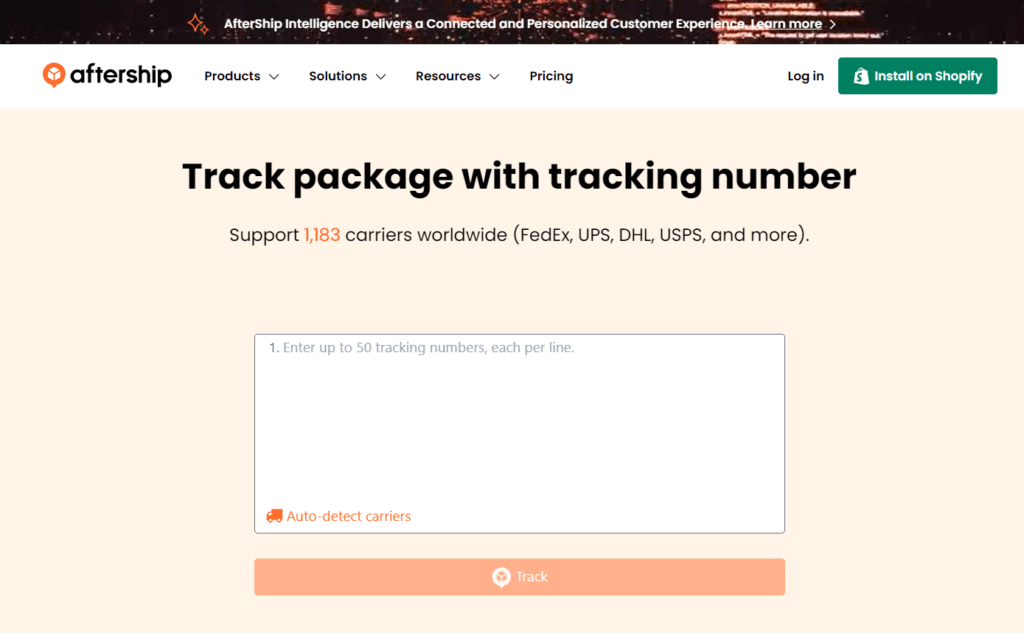
Features:
- Creates branded tracking pages with your brand’s logo and messaging.
- Its AI-powered email parser extracts eCommerce order details from users’ inboxes.
- Helps you compare shipping rates and estimates delivery dates (EDD).
- It supports 1,183 carriers worldwide and integrates with 70+ platforms.
- Its analytics and reporting features analyze shipment data, track delivery performance, and identify trends.
Pricing:
- Aftership offers various pricing plans for its services, including warranty, shipping, tracking, returns, and more.
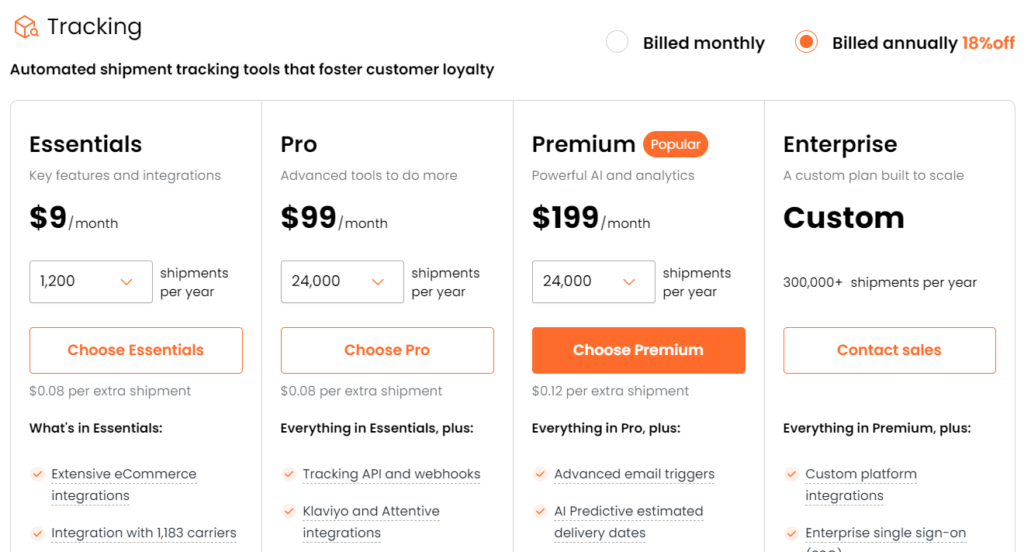
2. ShipStation
ShipStation is a fast and affordable e-commerce shipping software. It streamlines your order fulfilment, manages inventory from anywhere, and creates branded shipping experiences. You can print shipping labels, track packages, and even automate routine tasks with ShipStation.
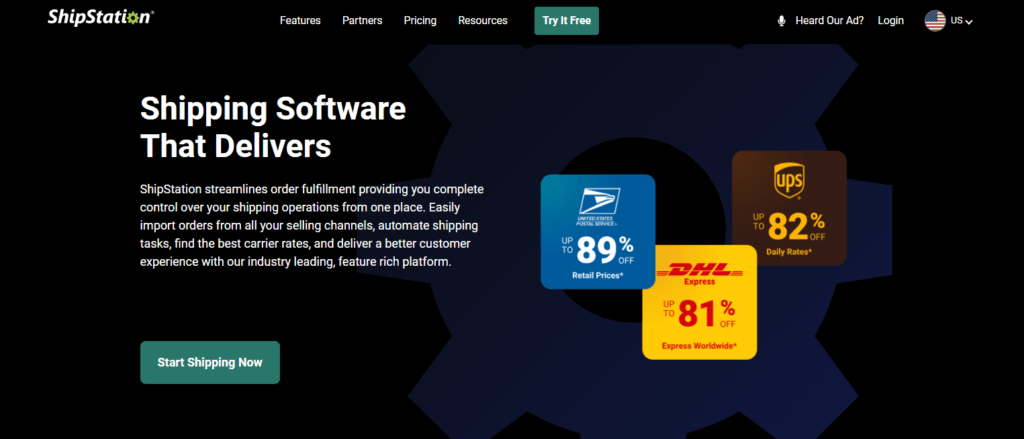
Features:
- It instantly updates tracking to all selling channels
- Provides bulk label printing and automated shipping
- It integrates with over 180 platforms
- Allows you to view stock levels, set inventory alerts, and allocate stock.
- Offers shipping discounts from major carriers like UPS, DHL Express, and USPS.
- Import orders from 100+ channels and automatically apply shipping configurations.
Pricing:
- ShipStation offers free trial up to 25 shipments. It’s paid plan starts at $10 per month
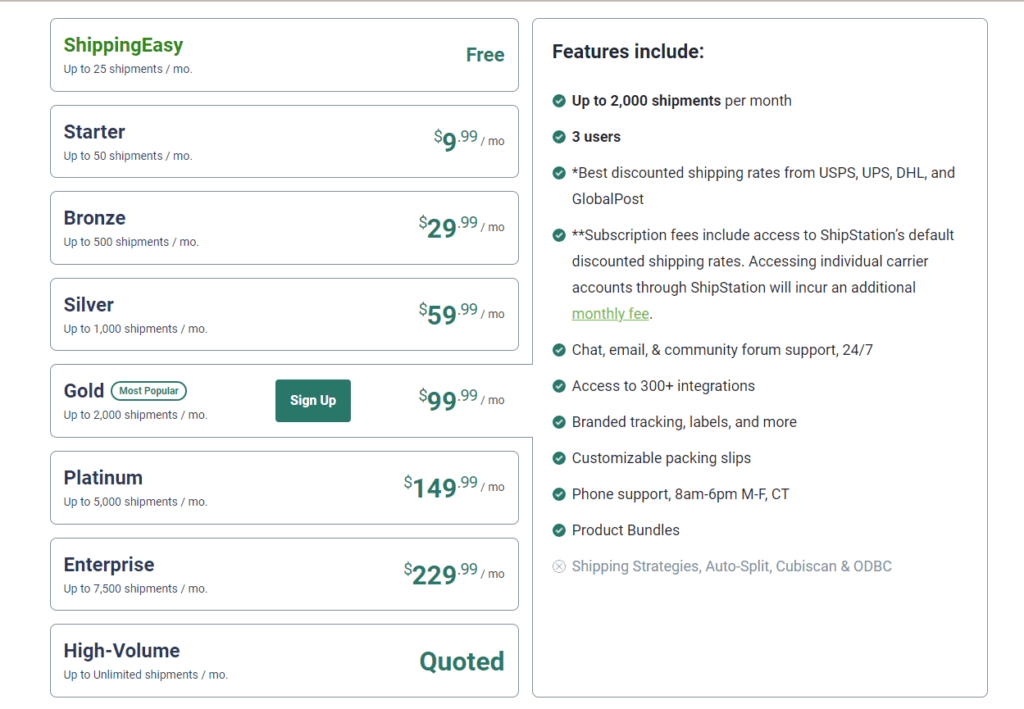
3. Shippo
Shippo is one of the best multi-carrier shipping software that works with over 40 carriers worldwide. It simplifies label printing, package tracking and returns. It also helps you create custom forms and invoices for international customers, making global shipping easy. Over 100,000 online businesses uses Shippo to grow their reach and manage shipments.
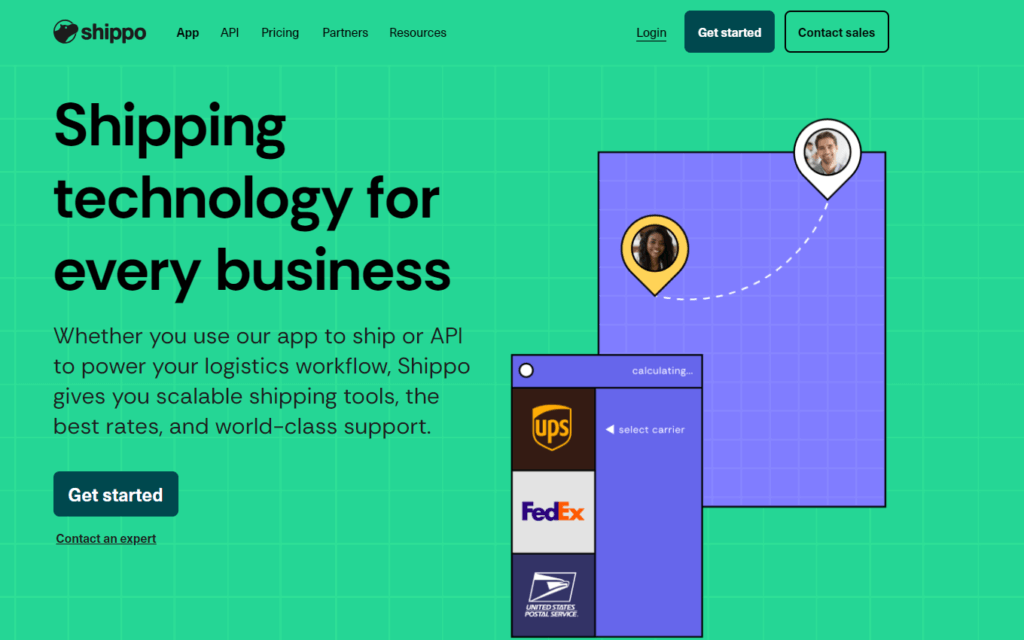
Features:
- Provides users with auto-generated bar codes for products.
- It offers real-time tracking and notifications
- Shippo offers a range of carrier options, including USPS, FedEx, and more.
- It integrates with e-commerce platforms like Shopify and WooCommerce
Pricing:
- Free plan is available. It’s paid plan starts at $19 per month.
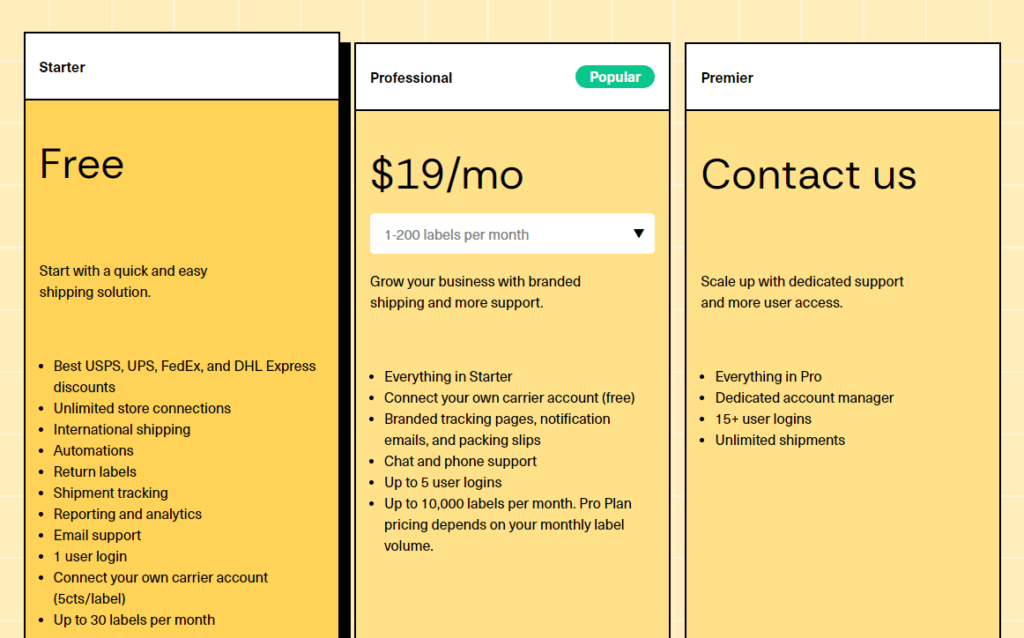
Conclusion
Choosing the right tool is important for the success of any e-commerce business. We’ve listed some of the best e-commerce business tools.
By aligning these tools with your business needs, you can build a user-friendly store, automate tasks, target the right audience, and gain valuable insights.
Before choosing any e-commerce tool just make sure that it matches your organization’s capabilities for the best results.
Explore My Other Articles:
1. 14 Must-Have Shopify Plugins For Your Online Store In 2026
2. Best Chatbot Builder Tools For Your Business In 2026
3. Best Plagiarism Checker Tools For Bloggers, Content Writers, And Students.
4. Best Whatsapp Marketing And Automation Software
